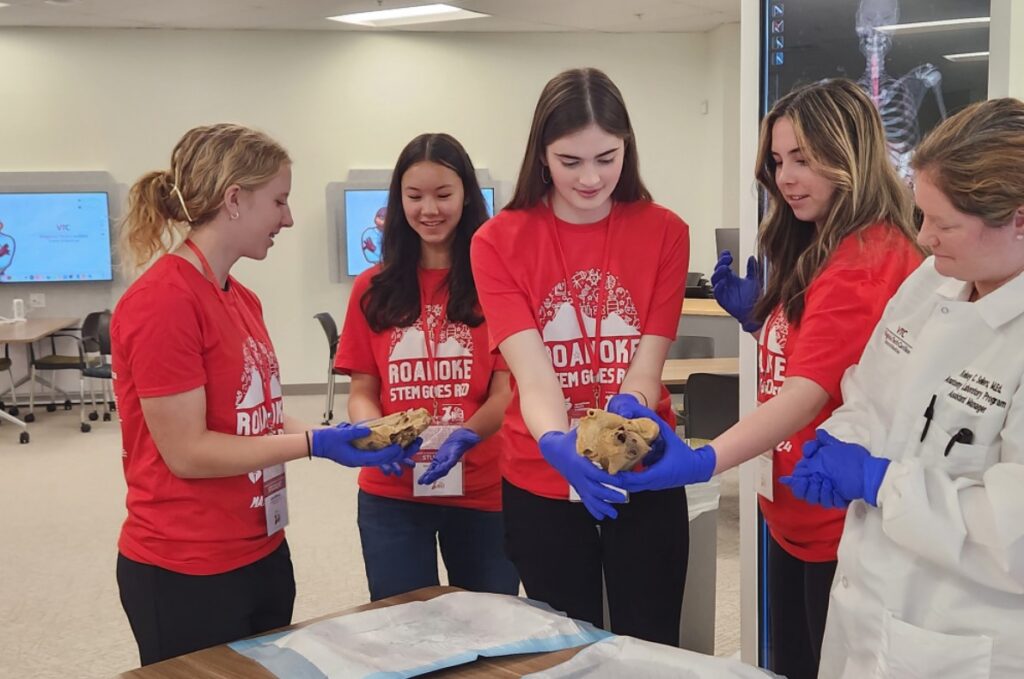The Claude Moore Charitable Foundation is partnering with the Blue Ridge Partnership for Health Science Careers, which was founded in 2019 in response to the region’s urgent need for health care workers.
by Emily Schabacker
July 30, 2024
A Roanoke-based program that has worked on addressing health care workforce shortages will serve as the model for a new statewide initiative designed to introduce middle school and high school students to careers in health care.
The Blue Ridge Partnership for Health Science Careers, anchored by Carilion Clinic, was founded in 2019 in response to the region’s urgent need for health care and health science workers. Made up of educators, employers, economic development professionals and community partners, the organization has established a collaboration across sectors to address workforce shortages.
Its structured approach drew the attention of the Claude Moore Charitable Foundation, a private philanthropic organization in Virginia that provides assistance to charitable and educational programs. It is primarily focused on education and health care initiatives.
The foundation has invested more than $24 million in workforce programs to create entry points and advancement opportunities in health care careers, but its tax designation prevents fundraising. The new independent nonprofit, Claude Moore Opportunities, will allow the organization to raise the funds it needs to expand its statewide collaborations.
Late last year, more than 8,000 job ads were posted online for health care practitioners and technical workers in Southwest Virginia, according to data from George Mason University’s Virginia Health Workforce Center, which derives its funding from the Claude Moore Charitable Foundation. About 2,500 ads were posted for health care support workers and community and social service workers.
Health support occupations like dental assistants, nursing assistants, sterile processing technicians and pharmacy technicians are experiencing the fastest increase in job demand.
The workforce shortage isn’t a new issue; it existed even before the pandemic. But the problem is compounded by numerous government workforce agencies that serve similar populations, said Dr. Bill Hazel, CEO of Claude Moore Opportunities and the state’s former secretary of health and human resources during the McDonnell and McAuliffe administrations.
“You might ask how that works, and the answer is not very well,” Hazel said. “Each program has to be defined. So you have all of these programs with their own eligibility standards and their own rules. And that drops down on the locals like a ton of bricks.”
As a philanthropic entity, Claude Moore Opportunities has the flexibility and the authority to enhance the effectiveness of these programs through collaboration, Hazel said.
To do this, Claude Moore Opportunities is partnering with the Blue Ridge Partnership for Health Science Careers.
Based in the Roanoke and New River valleys, Lynchburg and the Alleghany Highlands, the partnership will serve as the model for Claude Moore Opportunities, leveraging its experience in building cross-disciplinary committees.
Cynthia Lawrence, president of the partnership, also serves as the director of the office of workforce development at Carilion Clinic. Her dual leadership has made employers a key component in addressing workforce issues, which is advantageous, Hazel said.
“Bringing in employers helps make sure that what is being taught is relevant. For example, accreditation [for medical education] was set some years ago and has no relevance to the current workforce situation,” Hazel said.
The Blue Ridge Partnership for Health Science Careers has used findings from its various committees to lobby at the state level. Lawrence said those legislative efforts have addressed barriers to credentialing and training.
“We’ve broken down silos and built a level of trust between all of our academic and economic institutions to the point that we are sharing information that just has never been shared before,” Lawrence said.
The goals for the partnership extend beyond addressing the workforce shortage. By introducing young people to health care jobs during middle and high school, the aim is to guide them toward family-sustaining careers that are close to home.
“The best way we can help young people with disadvantaged backgrounds is to help them find career paths that will enable them to grow and support themselves,” Hazel said. “The beauty of health care is you don’t have to leave home to do it.”
For health care support professionals, the average annual salary in Virginia is about $33,100 a year. Jobs for health care practitioners and technical workers typically offer higher salaries, and there are many more companies recruiting for these positions.
The most sought-after positions that employers are recruiting for this year in the region that includes the Roanoke and New River valleys, the Alleghany Highlands and Lynchburg are registered nurses, with 2,969 job ads posted; medical and health services managers, with 969 job ads; social and human service assistants, with 717 jobs ads; and licensed practical and licensed vocational nurses, with 697 jobs available, according to data from George Mason University.
By focusing on K-12 students, the Claude Moore Charitable Foundation found that many kids aren’t considering health careers due to limited exposure to the field. The foundation’s educational initiatives are intended to broaden the pipeline by getting students interested and engaged in health science careers at an early age. With Claude Moore Opportunities, the foundation will be able to expand existing programs.
Claude Moore Opportunities has already received one donation from Virginia Ready, a nonprofit workforce development initiative that was founded in response to the COVID-19 pandemic.
Virginia Ready is winding down its operations after four years and is donating its remaining $1.3 million to five different organizations.
“Cultivating an interest in health does two things: It may get people interested in health careers … but more than that it broadens the horizons for healthy lifestyles and behavioral health,” Hazel said. “We always try to find synergies in the initiatives we fund.”
https://cardinalnews.org/2024/07/30/a-program-developed-in-swva-will-serve-as-a-statewide-model-to-address-a-shortage-of-health-care-workers/

